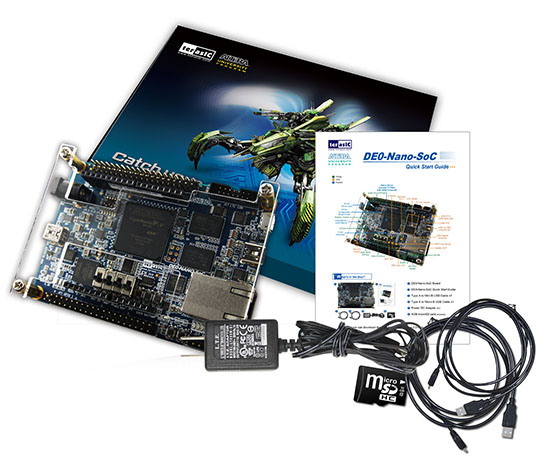What's different between the DE0-Nano-SoC kit and the Atlas-SoC kit?
The hardware is the same for the DE0-Nano-SoC kit and the Atlas-SoC kit. The only difference is the getting-started process for the two kits. Users can freely use the DE0-Nano-SoC kit resources on the Atlas-SoC kit and vice versa.
For more details on the Atlas-SoC kit, please visit: http://www.rocketboards.org/atlas-soc (The site is still under construction.)


DE0-Nano-SoC Resources
Documents
| DE0-Nano-SoC_QSG | 1.0.0 | 2485 | 2015-05-21 |  |
| DE0-Nano-SoC_User Manual | 1.0.0 | 3531 | 2015-05-21 |  |
CD-ROM
| DE0-Nano-SoC CD-ROM | 1.0.5 | - | 2015-06-09 |  |
Reference Designs with Selected Daughter Cards
| LT24 | 1.0.0 | - | 2015-06-02 |  |
| Arduino 1.8" TFT | 1.0.0 | - | 2015-06-02 |  |
Linux BSP (Board Support Package): MicroSD Card Image
| Linux Console | 3.13 | 4GB | 108658 | 2015-05-13 |  |
Atlas-SoC Kit Resources
Documents
| Atlas-SoC kit_QSG.pdf | 1.0.0 | 1952 | 2015-05-21 |  |
| Atlas-SoC_User_manual.pdf | 1.0.0 | 3498 | 2015-05-20 |  |
Please note that all the source codes are provided "as is". For further support or modification, please contact Terasic Support and your request will be transferred to Terasic Design Service.More resources about IP and Dev. Kit are available on
Altera User Forums.
Other course resources you might interested:
School: Cornell UniversitySenior Lecturer: Bruce Land
Course 1: - ECE5760 Advanced Microcontroller Design and system-on-chip [DE2]
Course 2: - ECE 5760 Simplified Floating Point for DSP [DE2]

- DE0-Nano-SoC Board
- DE0-Nano-SoC Quick Start Guide
- Type A to Mini-B USB Cable x1
- Type A to Micro-B USB Cable x1
- Power DC Adapter (5V)
